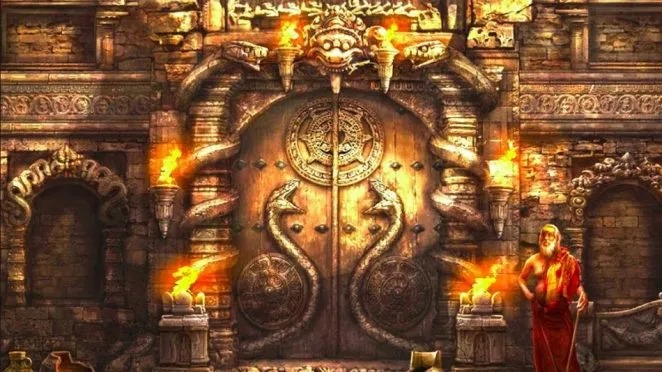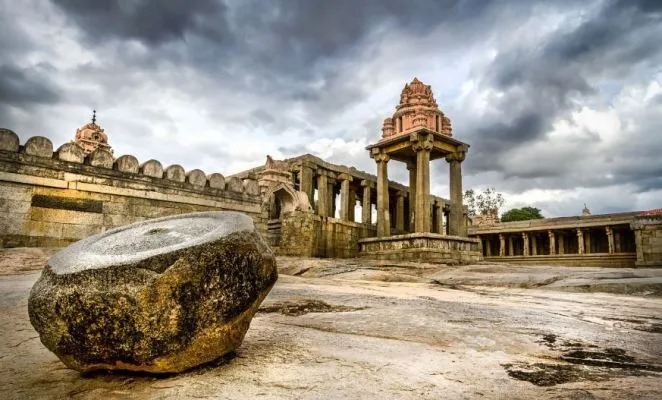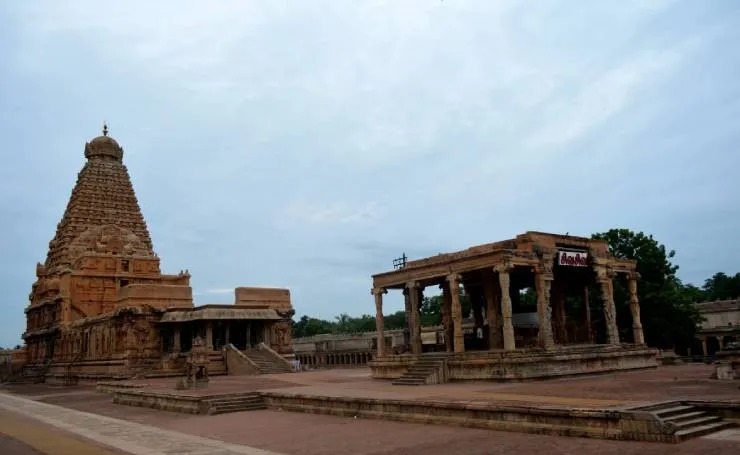Table of Contents
Toggle

Hello friends.
Welcome to the new blog on our website. Today, we are going to discuss a unique tradition of Indian temples where the temple doors open early in the morning and close before midnight at 12 AM. Have you ever wondered why the beginning and end of the day in temples are so special? In today’s blog, we will unveil this mystery. So, stay with us on this wonderful journey.
In India, temples hold a distinct significance. These temples are not only spiritual places but also centres for social and cultural activities. The rituals in temples start very early in the morning, usually before sunrise. This time is known as ‘Brahma Muhurta’ which is considered the best time for yoga and meditation.
The day begins with the morning worship or ‘Mangala Aarti’ during which the deities are awakened, bathed, and adorned with new clothes. Throughout the day, there are several sessions of worship, which include offering food (bhog), incense, and lamps, and evening Aarti is included. Temple doors usually remain open after sunset as well so that people can visit after returning from their work. However, the temple doors close before midnight at 12 AM, based on the idea that the deities also rest. This is called ‘Shayana Aarti’ during which the deity is prepared for night rest.
Historical Reasons for Temple Doors Closing Before Midnight
Security Reasons in Closing Temple Doors
In ancient times, temples often housed valuable items and donated properties. Due to a lack of security at night, the risk of theft and looting increased. Therefore, closing the temple doors early was a measure to ensure their security.
Discipline and Rules
Indian culture places great importance on routine. Since ancient times, the morning has been considered more auspicious for holy activities, while night is deemed a time for rest. Therefore, temples close early in the evening to allow both deities and priests to rest.
Scientific reasons for temples closing before midnight
Natural Light
Before the invention of electricity, temples used natural light. At night, in the absence of natural light, alternative means were needed to illuminate the temples, which were often insufficient.
Energy Conservation
Closing early helps save energy, which is still an important reason today. Closing temples early at night reduces electricity consumption, which is beneficial from an environmental and energy conservation perspective.
Environmental Adaptation
Temples are designed and built to maximize the use of natural light and air. During daylight, temples are naturally illuminated, reducing electricity consumption. At night, due to the lack of natural light, more energy is needed, which increases energy consumption. Therefore, temple doors are closed at night to save energy.
Respect for Biological Clock
The human circadian rhythm, or biological clock, is regulated by natural light. Being active during the day and resting at night aligns with our biological clock. Temples also operate according to this biological cycle, ensuring the health and well-being of priests and devotees.
Promotion of Peace and Stability
Night time is considered ideal for peace and self-reflection. Closing temple doors early not only provides peace but also stabilizes the surrounding environment, helping maintain a spiritual atmosphere.
Cleanliness and Maintenance
Closing temple doors at night provides time for cleanliness and daily maintenance. This time is used to keep the temple premises clean and organized, ensuring a pleasant and clean environment for devotees the next day.
So friends, this was our discussion today in which we saw that traditions not only reflect our faith towards deities but also show how we consider them as part of our lives. We hope you liked this blog. If you found this blog useful, please share it and do not forget to visit to our website.
Thank you and goodbye.
Reference
- https://Www.Herzindagi.Com/Hindi/Society-Culture/Why-Are-Temple-Doors-Closed-At-Night-Article-238961
- https://Hi.Quora.Com/%E0%A4%AE%E0%A4%82%E0%A4%A6%E0%A4%BF%E0%A4%B0%E0%A5%8B%E0%A4%82-%E0%A4%95%E0%A5%8B-%E0%A4%B0%E0%A4%BE%E0%A4%A4-%E0%A4%B9%E0%A5%8B%E0%A4%A8%E0%A5%87-%E0%A4%AA%E0%A4%B0-%E0%A4%AC%E0%A4%82%E0%A4%A6
- https://Www.Youtube.Com/Watch?V=MkaT3DWx6cM/
जय श्री राम।।
Please Share Through Various Platforms.


Sharad Purnima – Revolutionary Rituals & its importance
या देवी सर्वभूतेषु शक्ति-रूपेण संस्थिता।नमस्तस्यै नमस्तस्यै नमस्तस्यै नमो नमः॥ i.e., “Salutations again and again to the Divine Goddess who dwells
Durga Puja: Mahashaptmi Significance, Rituals, and Spiritual
या देवी सर्वभूतेषु शक्ति-रूपेण संस्थिता।नमस्तस्यै नमस्तस्यै नमस्तस्यै नमो नमः॥ i.e., “Salutations again and again to the Divine Goddess who dwells

“Navaratri: A Pivotal Tour of Inner Power and Divine Triumph”
या देवी सर्वभूतेषु शक्ति-रूपेण संस्थिता।नमस्तस्यै नमस्तस्यै नमस्तस्यै नमो नमः॥ i.e., “Salutations again and again to the Divine Goddess who dwells

Mahalaya Amavasya: A Sacred and Spiritual Festival – 02
Mahalaya Amavasya is a sacred Hindu observance marking the end of Pitru Paksha—a period dedicated to honoring ancestors through rituals like shraddha and tarpan. Families across India pay homage to departed souls, seeking their blessings and peace. This day not only upholds the tradition of expressing gratitude to ancestors but also heralds the onset of Devi Paksha and Durga Puja celebrations. Mahalaya Amavasya stands as a beautiful blend of remembrance, spiritual reflection, and the renewal of hope, emphasizing the eternal bond between generations and the cyclical nature of life itself.

महालय अमावस्या: एक पावन और आध्यात्मिक पर्व
ॐ पितृभ्यो नमः।श्रद्धया पितॄन् स्मरामि विश्वपितॄन् च सर्वशः।तेषां पुण्यकृतां देवानां च पितॄणां च वयं नमामः। i.e., Om salutations to the

Hindutva: The Ultimate Political Empowerment of Culture – 02
नमस्ते सदा वत्सले मातृभूमे त्वया हिन्दुभूमे सुखं वर्धितोहम्।महामङ्गले पुण्यभूमे त्वदर्थे पतत्वेष कायो नमस्ते नमस्ते॥ i.e., O loving Motherland, I always

Why do temple doors close at 12 PM?
Hello friends. Welcome to the new blog on our website. Today, we are going to discuss a unique tradition of
Posts
- “Navaratri: A Pivotal Tour of Inner Power and Divine Triumph”
- Mahalaya Amavasya: A Sacred and Spiritual Festival – 02
- महालय अमावस्या: एक पावन और आध्यात्मिक पर्व
- Hindutva: The Ultimate Political Empowerment of Culture – 02
- हिंदुत्व: भारतीय सांस्कृतिक पहचान का राजनीतिक सशक्तिकरण
- History of Indonesia – During the Hindu-Buddhist Period
- हिंदू-बौद्ध काल – इंडोनेशिया का इतिहास
- Exploration of Hindu Temple and Architecture: Temples and Their Symbolism
- हिन्दू मंदिर और वास्तुकला का अन्वेषण: मंदिर और उनका प्रतीकवाद
- The Importance of Ayurveda in Sanatana Culture
- आयुर्वेद का हिन्दू संस्कृति में महत्व
- Understanding the concept of Dharma in Hindu Philosophy
- हिंदू दर्शन में धर्म की अवधारणा (The concept of Dharma in Hindu philosophy)
- The Symbolism of the Lotus in Hinduism
- हिंदू धर्म में कमल – एक प्रतीक
- Buddha Purnima (बुद्ध पूर्णिमा)
- Importance of Janeu (जनेऊ का महत्व)
- Exploring Lessons from the Bhagavad Gita: The Karma
- Celebrating major Hindu festivals and their significance – 02
- भगवद गीता से शिक्षा: कर्म योग
- Hindu deities and their symbols in everyday life
- हिन्दू देवी-देवता और उनके प्रतीक
- Importance of karma (कर्म का महत्व)
- कर्म का महत्व (Importance of Karma)
- Importance of meditation and yoga (योग और ध्यान का महत्व)
- योग और ध्यान का महत्व (Importance of Yoga and Meditation)
- Importance Of Khadau 0r Paduka (खड़ाऊ या पादुका का महत्व)
- खड़ाऊ का महत्व (Importance of Khadau)
- Why do people keep a tuft of hair or choti ?
- Importance of Saffron [Bhagwa] (भगवा का महत्त्व)
- Celebrating Major Hindu Festivals and Their Significance
- जनेऊ का महत्व (Importance of Janeu)
- importance of Vastu Shastra in Santana culture
- Sharad Purnima – Revolutionary Rituals & its importance
- Durga Puja: Mahashaptmi Significance, Rituals, and Spiritual
- Importance of Rudraksha (रुद्राक्ष का महत्व)
- रुद्राक्ष का महत्व (Importance of Rudraksha)
- हिन्दू धर्म के प्रमुख त्यौहारों का उत्सव और उनका महत्व – 02
- हिन्दू धर्म के प्रमुख त्यौहारों का उत्सव और उनका महत्व
- Why do temple doors close at 12 PM?
- Why is Lord Ganesha worshiped first?
- बुद्ध पूर्णिमा
- सनातन संस्कृति में वास्तु का महत्व
- The Significance of Hanuman Chalisa
- कुछ मन्दिर के द्वार १२ बजे बंद क्यों हो जाते हैं ?
- सनातन धर्म में चोटी रखने की संस्कृति क्यूँ !
- गणेश जी की पूजा सबसे पहले क्यूं होती है?
- भगवा का महत्त्व
- हनुमान चालीसा का महत्व


